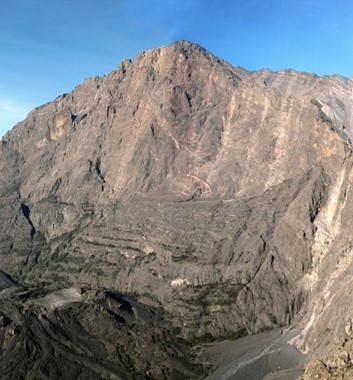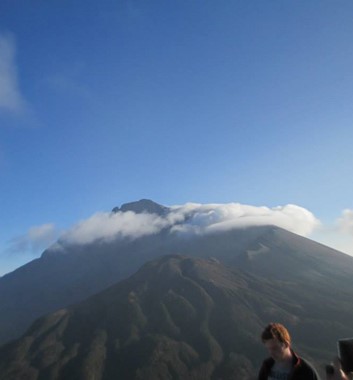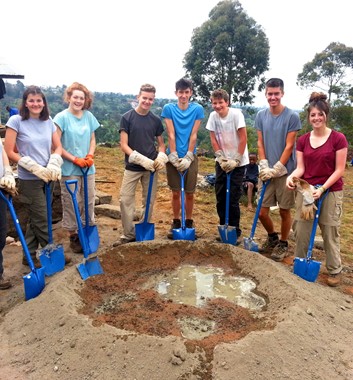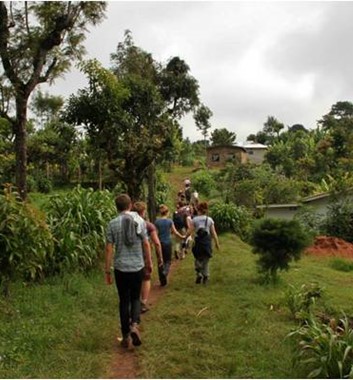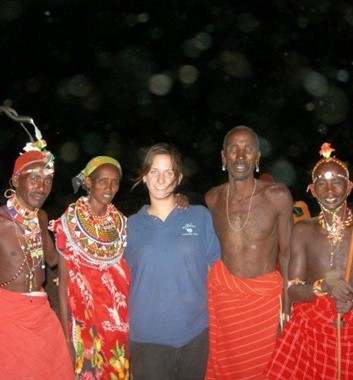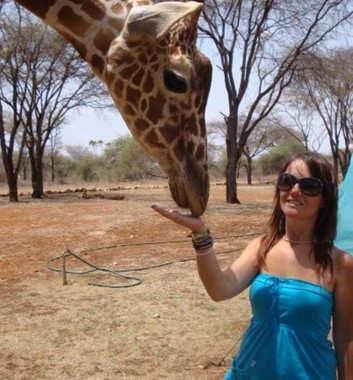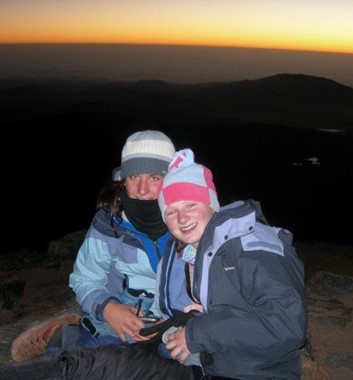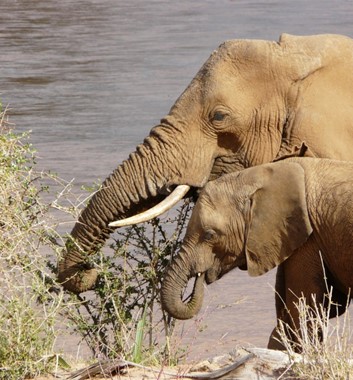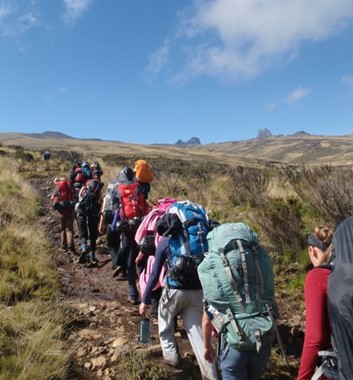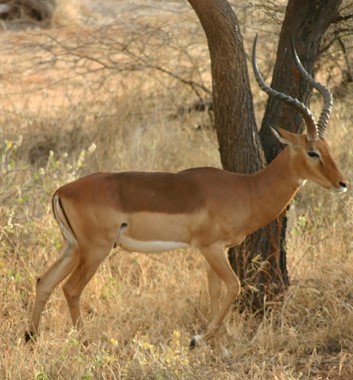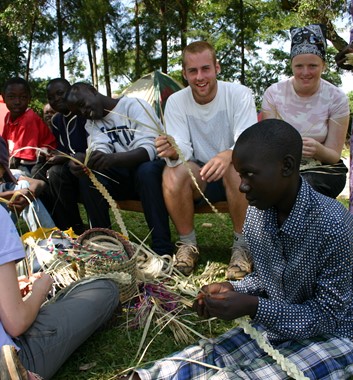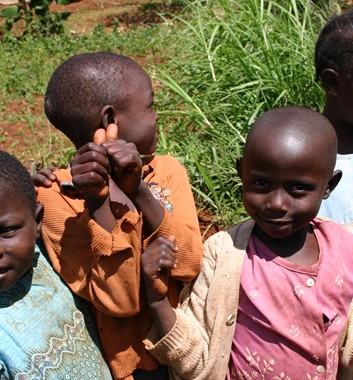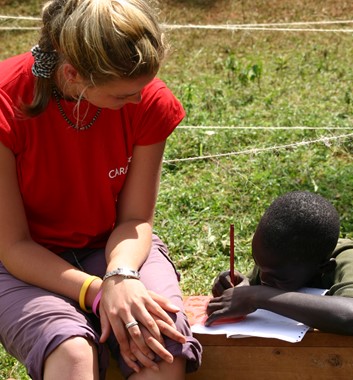Overview
Our Kenya school programme has been so successful that it has grown and developed into Tanzania since 2013. The location is Marangu village on the slopes of Mount Kilimanjaro, an area which has seen many changes as the climate change on the mountain has changed the geography of the land. We started with a plan to renovate and rebuild schools in the villages because the local people were having to send their children every day to Moshi, a bus journey of forty minutes which was costing too much.
This area is also where we employ many people with our climbs on Kilimanjaro and Mount Meru, so it is appropriate that this school expedition includes a climb of Mount Meru, a great ascent in wild country but not at all technical. Read what students from the Round Square Big Build expedition in 2017 had to say about their experience working on the school development projects at Ng'aroni Primary School
Just like the trip in Kenya, this expedition has the hallmarks of travel and culture and adventure, combined with service to the community and interaction with the local people. We are particularly proud that this entire trip has been put together and organised by the staff in Kenya, who have had years of experience running similar trips in their own country.
Here is a great video made by a young student from Writhlington school near Bath about his trip to Tanzania, and it captures the essence of the trip really well:
The project which is determined by Moving Mountains is at Ng'aroni Primary School in Tanzania, and our aim over the coming years is to create an excellent educational facility for up to 350 children, with an Early Child Development centre as well. This is a priority for the education authorities.
Climb of Mount Meru
This is a great adventure for everyone, not technical but with one short section near the summit that needs a bit of care and sometimes a handrail of rope if the rock is slippery. Lots of wildlife and camping all the way, standing on top of a Mount Meru is a real achievement, as this video shows very well!
Wildlife Safari
Every trip to Africa has to have a safari and Tanzania has some of the finest parks on offer. We use our overland safari vehicles to enjoy the best that the land has to offer, an unforgettable holiday out on the plains of the southern Serengeti.
For more information, see our Tanzania School Trip Prep Page.
Why us for this school trip?
We have more than two decades of running successful youth expeditions in east Africa, and they have been successful and life changing for both the visitors and the hosts. Many of the original 'Africampers' have gone on to study international development and pursue diverse careers in the third sector.
Our projects are properly researched and identified by our partner charity Moving Mountains Trust as part of ongoing long-term strategy for support. They are not one-off projects created just to tick a box on an itinerary. There is an emphasis on the developmental perspective of every trip like this, over and above any commercial concern.
We have the qualification and experience to run development projects in a developing country and our projects are justified by local stakeholders and local education authorities in the Marangu area.
We run an imaginative and relevant training programme for all people going on these trips which means people come out more prepared and ready to tackle the challenges. We make a point of discussing stereotypes and morals surrounding international development and we ensure people are informed about their trip.
How fit do you need to be?
You do not need to be super-fit for this trip, however the expedition element is moderately demanding with some long days of sustained walking with a backpack. The effects of altitude will also further tax your body on the mountain, but just go slowly and rest and drink more than usual.
On the project phase you will usually camp close to the main Marangu medical centre and walk up to the project each day. This is a beautiful walk through semi-tropical forests and past coffee and banana fields. It is a small path and can be a bit muddy after recent rain. It is a beautiful way to start the day and to get warmed up for the project work.
The terrain on Mt Meru varies throughout which leads to an interesting and ever changing environment. During the climb you will go from lowlands through equatorial forest and alpine heath, then across a lunar-like rocky landscape up to a rocky volcanic summit. Mt Meru's position just below the equator offers an opportunity to experience extremely varied terrain and conditions all in one expedition.
Mount Meru is essentially a walk all the way. There is no need to climb rock faces nor get close to precipitous drops along the way, no rock climbing or specialist equipment is needed. There is a short section close to the summit which involves a slightly exposed traverse over bare rock. There are steel rings in place and we will set a handrail rope if necessary. In exceptional circumstances where there is a lot of rain or snow it may not be safe to cross this part ad we may have to stop just short of the main summit and watch the sunrise from Cobra Point instead. The paths are in good condition and fairly well trodden with rangers stationed at each of the huts as well as on the trail generally.
During the safari part of your adventure, you will be entering reserves/parks usually consisting of dirt roads and sand tracks and not tarmac. If conditions are wet this can lead to adventurous driving but be assured that our drivers are well versed in safe and professional driving skills. If the weather is very dry then the terrain can be dusty so it's worth bringing a shawl or light scarf to cover your mouth and nose. The vehicles are well maintained and professional safari vehicles. It is important to remember that you are in the animals environments and you are not top of the food chain!
School trip packing list
The basic idea of your kit is to keep you warm, dry, protected from the sun/rain and comfortable in the various environments that we will find ourselves in.
- BAGS - A duffel type bag for general use, a rucksack for carrying kit on the mountain and a small pack for carrying a few items on day trips
- GENERAL CLOTHING - Clothing for day to day travel, time on the camp & safari
- SHELL - Waterproof layer to keep off wind/rain
- INSULATION - Layered system to keep you warm on the mountain- body hands & head
- FEET - Day to day shoes, sturdy trekking boots, flip flops/sandals
- SLEEPING - Warm sleeping bag and camping mat to get a good nights sleep
- EATING/DRINKING - Water bottles and personal plate, bowl, mug & cutlery
- WASHING & MEDICAL - Suncream, anti-Malarials and a small 1st aid kit
More information about packing for this school trip
- You will have to dress conservatively in the villages and in public in general. You will draw unnecessary attention to yourself and probably cause offence if revealing clothing is worn. Remember we are guests in a country and culture that is very different to ours, we need to be respectful guests.
- Make sure hiking boots fit well and that you have used them at least a few times before the trip to break them (and your feet) in.
- Clothing for the mountain needs to be synthetic and quick drying in case it rains. Make sure that you have a change of trekking trousers and base-layer top and something like a fleece top as well as a warm coat. It can be well below freezing at night and on at least the first half of summit day.
- Take a good warm sleeping bag of at least three seasons, and a good sleeping mat for insulation. A sleeping bag liner made out of cotton (or silk) is useful too and helps to keep the bag clean or can be slept in if it gets too hot. Make your own sleeping bag liner if you want from an old sheet sewn into a mummy shape. Don't make it too tight around you though.
- You will be able to wash clothes - handwash in washing powder, that is, and local women will also offer to wash your clothes on the camp for a small charge. The problem can be trying to dry things, heavy cotton garments can take ages to dry where-as light synthetic ones dry very quickly. On the mountain there is no opportunity (or need) to wash clothes at all.
- Take old clothes to wear for the project and camp, they may get dirty or covered in cement or paint. You will want travel clothes which are clean for the travelling home bit, and maybe for the safari, but on the camp and project it may be pretty dirty. Choose your clothing based on usefulness and durability, not for fashion statements. Some clothes you may want to give away or swap at the end for souvenirs.
- If you wear contact lenses take plenty of saline and comfort drops- it can get dusty. And obviously have your glasses on hand as back up.
- Bringing your own mosquito nets are optional. The tents have inbuilt nets and people in the past have generally not had a big problem with insects.
- Do not bring porcelain plates - bring plastic and a few spare spoons - they always go missing. Make sure that plates and bowls are of a generous size so that you can fit the food in; you will be hungry!
- Keep your money somewhere safe, bum bags or body wallets can be useful. Do not bring large wads of notes with you. If you take sterling cash with you make sure they are good condition Bank of England notes, not regional notes, eg Northern Irish notes or Scottish notes.
- For the mountain, work on a layering system which gives you versatility - Synthetic base-layer tops or thermals, shirt or warm top, fleece, waterproofs. Gloves and hats are vital too.
Dates & Bookings
Itinerary
Tanzania School expedition itinerary
The following illustrates a very brief overview of a typical school expedition in Tanzania
| Days | Activity |
| 1 | Arrival, Briefings and Orientation |
| 2-11 | Volunteering & International Development Work |
| 12-16 | Preparation and climb of Mount Meru |
| 17-20 | Safari |
| 21 | Departure |
DETAILED ITINERARY
| Day | Elevation | Travel Time | Info |
|---|---|---|---|
| -1 | Depart Home | ||
| 1 | 900m | Arrive into Kilimanjaro Airport, to be met by Adventure Alternative staff and Moving Mountains representatives. Transfer to our camp in the town of Moshi. Settle in and have welcome introductions and briefings. | |
| 2 | 1800m | Travel to the location of your volunteering and international development project and settle in to camp there. Here you will meet local community representatives, who along with the Moving Mountains representatives will introduce you to the area and brief you on the nature and significance of the project. | |
| 3-10 | 1800m | You will camp in the heart of the local community and interact with the local people, including local students and school children. You will collaborate on the development project and be fully immersed in rural east African life. | |
| 11 | 1800m | At the close of the camp and project there will be a celebration and ceremony to allow everyone to enjoy the sense of achievement and to share their thanks. We will then travel back to the camp in the town of Moshi. | |
| 12 | 1800m | Following on from ongoing training throughout the project camp, today will be a final day of briefings and preparation ready for the climb of Mount Meru. | |
| 13 | 2615m | 1hr drive 4hrs walk | After breakfast we usually depart Moshi at about 8:30am to travel west below the south face of Kilimanjaro to its sister, Mount Meru and the Amboseli National Park entrance at Momella gate. Here we meet our team and start the climb with a picnic lunch then a trek up through the rich Afro-Montane forest to the first hut called Miriakamaba hut. We have dinner and stay overnight in the Miriakamba hut where we have dormitory bunk beds. |
| 14 | 3566m | 2-4hrs | After breakfast we will begin the climb through the Alpine Heath to the second hut called the Saddle. This is a steeper climb compared to yesterday and usually takes about 3hrs. We are gaining quite a lot of altitude and we will definitely feel it's energy-sapping effects. During the afternoon, we also have the option to climb little Meru peak which takes about an hour. Alternatively we will just take it easy and relax, hydrate and acclimitise. Dinner and overnight will be in the Saddle hut with dormitory bunk beds again. |
| 15 | 4566m | 5hrs+ | Wake up at mid-night and have a cup of tea and some snacks before starting our attempt of the main Meru peak. We will proceed to the summit via a rocky path around the spectacular rim of the collapsed crater. From up here it is easy to see the origin or Mt Meru as a volcanic cone with one side of it blown out to leave a spectacular crescent-shaped ridge with a vertical cliff on one side, plunging down to the crater and volcanic ash-cone below. After enjoying the views we will descend back down to the Saddle Hut for a full breakfast. The rest of the day will be spent resting and generally enjoying our location. Lunch, dinner and overnight will again be at the Saddle hut. |
| 16 | 900m | 6-8hrs Walk 1hr Drive | This morning we leave the Saddle hut and descend down to Momella gate via our first hut (Miriakamba). At the gate we will jump into our vehicles for the drive back to Moshi and a well deserved shower! |
| 17 | After our exertions on Mount Meru we now travel to the village of Mto wa Mbu, close to the entrance gate of Lake Manyara National Park. Here we will take a well earned rest by the pool at the Twiga Lodge Resort. | ||
| 18 | Today we take a safari into the Tarangire which is Tanzania's sixth largest national park. It is the vast number of baobabs that first capture the eye as you enter Tarangire National Park. The gently rolling countryside is dotted with these majestic trees, which seem to dwarf the animals that feed beneath them. Lake Burungi area is in the north-western part of the park and a tour drive in this area will offer you fascinating opportunities to watch large herds of flamingos and other species of birds feeding on aquatic organisms in Lake Burungi. This area also contains an isolated population of Oryx, Wildebeast, Lions, Elephant, Rhino, Gazelle, Cheetah, Buffalo, Warthog, hartebeest, long-necked gerenuk, Impala, Zebra, Dik-dik, Leopard, Hyena and fringe-eared oryx. The swamps are the focus for 550 bird varieties, the most breeding species in one habitat anywhere in the world. Tarangire's pythons climb trees, as do its lions and leopards, lounging in the branches where the fruit of the sausage tree disguises the twitch of a tail. | ||
| 19 | Today our safari takes us to Lake Manyara, described by Ernest Hemingway as the loveliest I had seen in Africa. game-viewing circuit through Manyara offers a virtual microcosm of the Tanzanian safari experience. The entrance to the park is lush forest with many ancient mahogany trees and many monkeys. This then opens up to a large grassy flood plain and the lake itself with a stunning backdrop of jagged blue volcanic peaks that rise from the endless Maasai Steppes. Inland of the floodplain, a narrow belt of acacia woodland is the favoured haunt of Manyaras legendary tree-climbing lions and impressively tusked elephants. | ||
| 20 | Today we pack up camp and make our way to Arusha where we can stop for some shopping or visits. Then onward to Moshi where we pitch our tents for the last time. Tonight we will enjoy a farewell meal with the team and reflect on everything we have done and experienced together over the last three weeks. | ||
| 21 | From Moshi we will transfer back across to Kilimanjaro airport for our international flight home. |
Cost
Tanzania School expedition cost £1,995.00
This is an all-inclusive land only cost, and we don't operate kitties or ask people to pay anything additional in cash except for tips and spending money.
INCLUDES
- Adventure Alternative staff and all ground support
- All internal transport, airport transfers and local travel
- All meals and drinking water
- All accommodation in safari tents and mountain huts
- Guides and porters on Mount Meru
- All fees and permits for Mount Meru
- All National Park fees for the safari
EXCLUDES
- Moving Mountains fundraising - minimum of £500 per person
- International return flight to Kilimanjaro Int airport (or Nairobi airport and a shuttle across the border)
- Travel Insurance
- Tanzania tourist visa (USD$50.00 for most nationals)
- Travel vaccinations and anti-malarial tablets
- Tips for mountain staff (~£50.00)
- Personal spending for souvenirs, snacks, etc
A deposit of £100.00 is required on booking to secure your place and we ask that the remaining balance is paid in full six weeks prior to your departure. Interim payments are normally made over a period of time.
Bookings can be made either by the school itself (with payments coming from a school bank account), or individually with the students. If the student is under 18 years of age then bookings and payments must be made via the parents or guardians.
Moving Mountains charity fundraising aim
The fundraising total therefore does not go into the Adventure Alternative account but goes directly to the charity. The money paid to Moving Mountains will fund the project you are doing and also some related programme costs for the charity. This is all agreed before any commitment is made.
For example a group may commit to raise £500.00 per person for Moving Mountains Trust, out of which £400.00 may go towards the project of building a school and £100.00 may go towards the teachers salary that the charity is paying. This ensures that the charity does not build something that cannot do anything. A classroom needs a teacher. The charity has always operated a policy of committing to both the infrastructure costs and also helping the people like teachers, social workers, children and families.
We are more than happy to discuss the destination of the money paid to the Moving Mountains Trust. It is important that any groups fully understands and accepts the ethos of the charity and the way in which it works with donors and beneficiaries.
Photos
Choose a scheduled date or contact us to set up private dates or a bespoke itinerary. The minimum deposit is £100.00 and the balance is due four weeks before travel.
- Duration 22 days
- Numbers 8-25
- Max Altitude 4600m
- Transport Safari truck
- Challenge Moderate
- Comfort Camping


